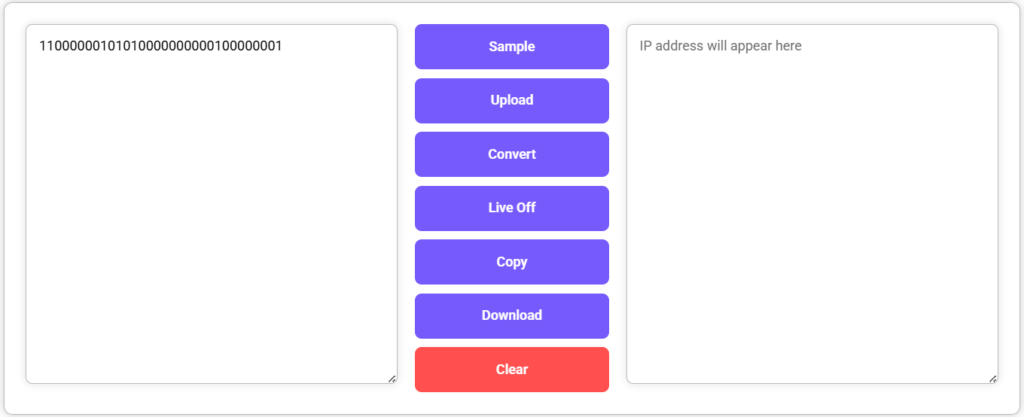When working with networks and computers, it’s worthwhile to know about the relationship between binary numbers and IP addresses. With our Binary to IP Converter for free, it’s no hassle to rapidly convert binary numbers to readable IP addresses. Be you as a student, an IT professional, or simply an enthusiast of networks, this utility will save you time and effort. Let’s discuss how you can use it and why you need it.
An Internet Protocol (IP) address is a home address for your device or computer on the Internet. Each time you go online, email someone, open a website, or watch a video stream, your device uses an IP address to connect with the server or other devices.
There are mainly two kinds of IP addresses:
1 IPv4: IPv4 is a 32-bit addressing system used to identify devices on a network. It is typically represented as four decimal numbers (e.g., 192.168.1.1).
2 IPv6: IPv6 uses a 128-bit addressing format to identify devices within a network. It is typically represented as eight groups of four hexadecimal characters, separated by colons (e.g., 2001:0db8:85a3:0000:0000:8a2e:0370:7334).
Binary is the fundamental language that computers can employ to process and store all information. It has just two digits: 0 and 1.
Each 0 or 1 is called a bit. All numbers, letters, images, and sounds are expressed in binary by employing combinations of 0 and 1.
Number 5 in binary is 101.
Binary to IP Converter is a program that converts a binary number (string of 0s and 1s) back into the normal IP address, such as 192.168.1.1.
Computers work in binary because they can only interpret 0 and 1, but humans can better handle regular numbers.
This utility instantly converts binary to an IP address without any manual work. Thus, it is beneficial to students, IT professionals, and anyone learning network concepts.
Step 1: Open the Binary to IP Converter tool.
Step 2: Upload your file or manually input the Binary number by typing or pasting it into the provided input box.
Step 3: Choose your conversion method: either click the Convert button for manual conversion or enable the Live On feature for real-time results as you type.
Step 4: After conversion, copy the IP output or download it as a .txt file for later use.
Quick and Simple: Simply paste in your binary number, press a button, and have the IP address in seconds.
Correct Results: The software provides you with accurate and trustworthy conversions each time.
Easy for Beginners: No expertise is required. Anyone can easily use it, even if you’re a networking newcomer.
Works on Any Device: You’re on a phone, tablet, or computer, no matter the device, the tool works great.
No Downloads Required: No need to download anything. Open the tool in your browser and use it.
Students:
If you are learning computer science, networking, or IT. This tool can assist you in understanding how binary numbers and IP addresses function.
IT Professionals and Network Engineers:
Individuals who deal with networks frequently need to translate binary into IP addresses for network setup, maintenance, or troubleshooting.
Teachers and Trainers:
If you are a teacher of computer fundamentals. This tool can simplify your task of describing binary and IP concepts to students.
Tech Enthusiasts:
Even if you’re merely interested in knowing how computers and networks function, this tool is an easy and entertaining method of learning more.

